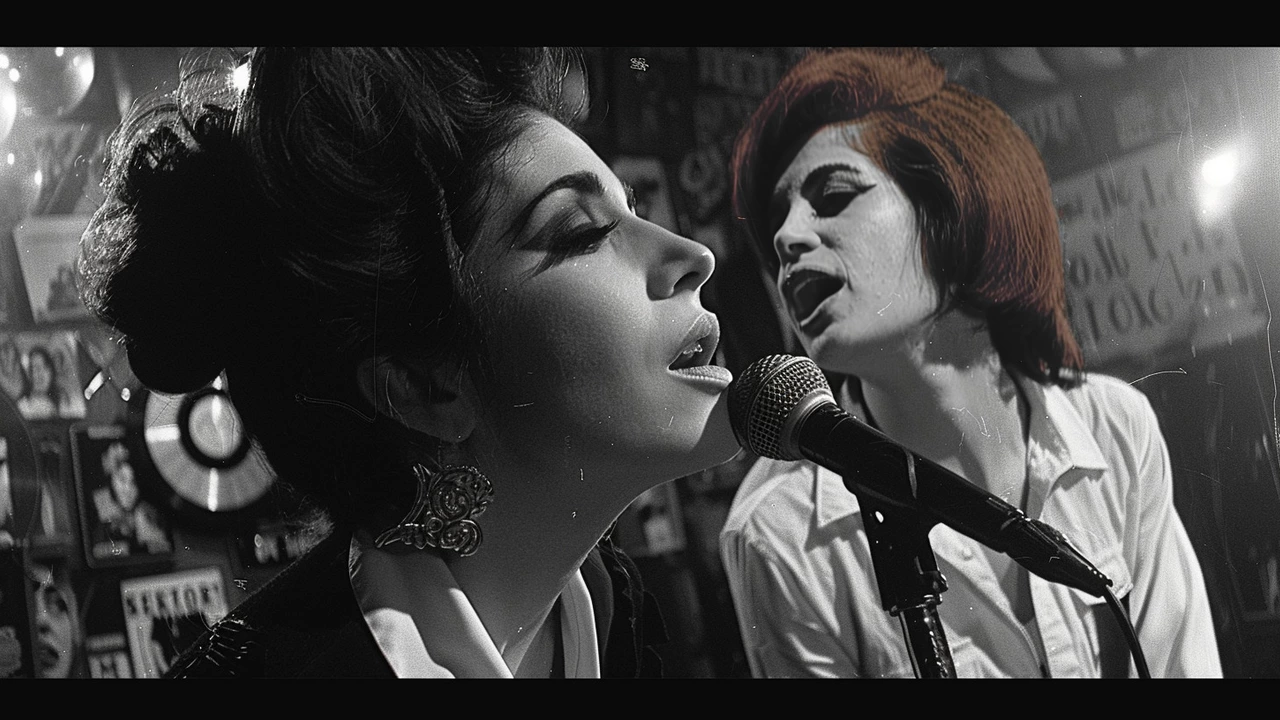
Amy Winehouse's music is often celebrated for its unique blend of retro charm and modern sensibility. As a self-confessed vintage obsessive, Winehouse's fascination with past eras didn't just inform her fashion choices and public persona—it lay at the very heart of her musical style. Among her many influences, one stands out prominently. The 1960s girl group, The Shangri-Las, left an indelible mark on Winehouse's artistry, helping shape some of her most memorable hits.
Born into a family with a rich musical background, Winehouse's love for classic tunes was almost predestined. Music was an omnipresent force in her upbringing. Her grandmother, who had been part of London's vibrant music scene and even dated the legendary jazz musician Ronnie Scott, played a pivotal role in nurturing young Amy's appreciation for the classics. Growing up, moments of family members singing standards filled her home, embedding a deep-seated love for vintage music within her.
For Winehouse, the appeal of the 1950s and '60s was about more than just nostalgia—it was about the storytelling, emotion, and dramatic flair that these eras encapsulated. This is precisely why The Shangri-Las resonated with her so profoundly. Known for their dramatic and atmospheric storytelling through lyrics, The Shangri-Las were a 1960s girl group that captured Winehouse’s imagination. Their songs, characterized by the use of character voices, spoken elements, and dynamic soundscapes, formed a blueprint that Winehouse would draw from throughout her career.
The Magic of The Shangri-Las
The Shangri-Las burst onto the music scene in the early 1960s with their distinctive style and emotive lyrics. Songs like 'Leader of the Pack' and 'Remember (Walking in the Sand)' showcased their ability to weave narrative into music, creating stories that fans could become engrossed in. For Winehouse, this narrative depth was a treasure trove of inspiration. Their ability to create entire worlds within their songs inspired her to infuse her music with similar vivid storytelling. This was not mere imitation, but a creative synergy that saw Winehouse evolve these elements into something uniquely her own.
Connecting the Past and Present
Winehouse’s admiration for The Shangri-Las went beyond their storytelling prowess. The group’s dramatic presentation and atmospheric production struck a chord with her, resonating with the rebellious yet deeply emotional style she is known for today. Winehouse’s 2006 album 'Back to Black' is a testament to this synthesis of past and present. Tracks like 'Back to Black', 'Rehab', 'Wake Up Alone', and 'Love Is A Losing Game' echo the soulful and narrative-driven essence of The Shangri-Las. In these songs, one can hear the influence of the girl group’s rhythm and style, reinterpreted through Winehouse’s lens of modernity and personal experience.
Live performances became another arena where Winehouse paid homage to her inspirations. She often included nods to The Shangri-Las during her shows, further highlighting the profound impact they had on her work. Whether through her renditions of classics or through the structural emulation within her own songs, the essence of The Shangri-Las lived on in Winehouse's performances, captivating audiences much like the original group did in their heyday.

A Lasting Legacy
Despite her tragically short career, Winehouse’s body of work continues to resonate, drawing new fans who discover the timeless quality of her music. Her ability to channel the spirit of iconic groups such as The Shangri-Las into songs that speak to contemporary listeners demonstrates her exceptional talent as a musician and storyteller. The classic influences combined with her personal touch resulted in anthems that feel both classic and fresh, resonating across different generations.
The legacy of The Shangri-Las, combined with Winehouse’s phenomenal talent, has led to the creation of music that stands the test of time. Winehouse’s songs, imbued with the nostalgia of past decades, have become defining anthems not just of her time but for future listeners as well. Her work invites listeners to dive into a soundscape that marries the charm of the old-school with the raw, emotional honesty of modern times.
Inspiring Future Generations
The impact that Amy Winehouse and her influences like The Shangri-Las have had on the music industry is undeniable. They have set a precedent for future artists who seek to blend storytelling, emotive depth, and retro inspirations in their work. As new musicians look back on the careers of Winehouse and The Shangri-Las, they find a rich tapestry of influences to draw from, ensuring that the legacies of these artists continue to inspire.
The story of how The Shangri-Las shaped Amy Winehouse is a compelling narrative of musical evolution and homage. It is a reminder of the enduring power of musical influences and the way they are passed through generations, creating an ever-evolving tapestry of sound. For fans of Winehouse, understanding this connection offers deeper insight into her music and the sources of her inspiration. It opens up a broader appreciation of the interconnectivity in the world of music, where past and present coalesce to create something extraordinary.
More Articles

Trump’s Tariff Plan and $2,000 Dividend Proposal Risk $22K Household Losses, Warn Economists
Trump's April 2025 tariff plan and $2,000 dividend proposal risk $22,000 lifetime losses for middle-income households, with economists warning of GDP declines, capital flight, and unsustainable debt — even as a temporary China deal offers only fleeting relief.

Best Rural Pub: The Plough in Wigglesworth leads Julian Smith’s Local Pub Awards 2025
The Plough in Wigglesworth has been named Best Rural Pub in Julian Smith MP’s Local Pub Awards 2025 after public nominations and voting. The Black Swan in Ripon took Best Pub overall, with other winners including the Woolly Sheep Inn in Skipton and Sera from The Albion, Skipton. The awards spotlight local pubs as community hubs and employers across Skipton and Ripon.

